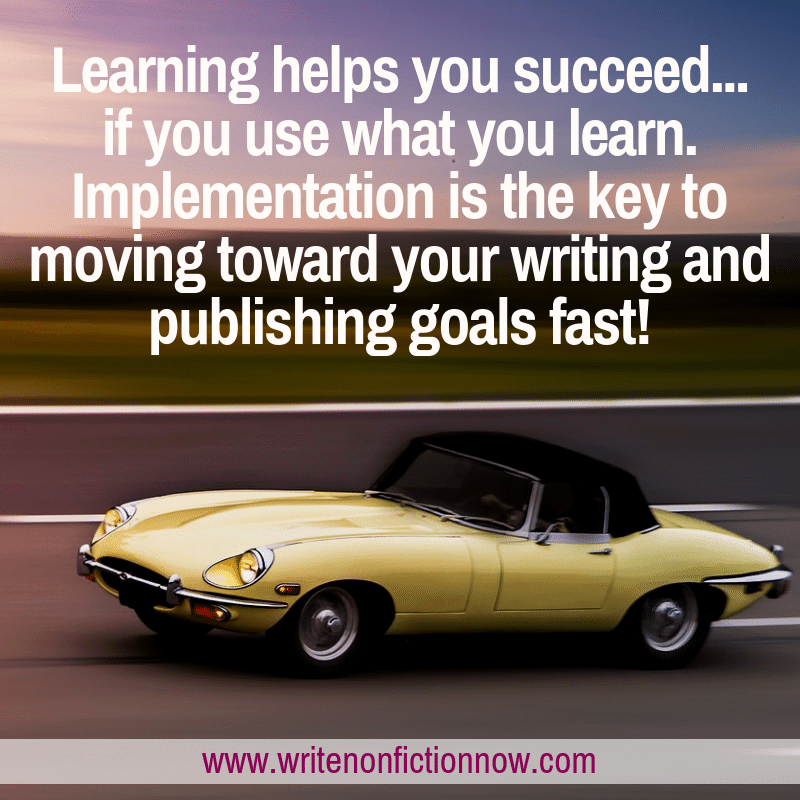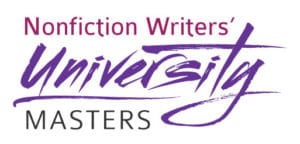 “When do I stop learning about writing and publishing and just write and publish?” That’s a question I get asked frequently. The answer: “As soon as you ask that question, it’s time to begin implementing what you’ve learned.”
“When do I stop learning about writing and publishing and just write and publish?” That’s a question I get asked frequently. The answer: “As soon as you ask that question, it’s time to begin implementing what you’ve learned.”
Actually, here’s my best advice: Learn something, and then implement what you just learned. Don’t learn something new until you have that mastered—or need some specific knowledge to help you implement it.
Continual Learners
Don’t get me wrong. I’m all for learning!
Those of us interested in personal development continuously want to learn and make progress in all areas of our lives. We seek out new books, courses, seminars, and videos that teach us something new so we can improve ourselves or change our lives.
The most successful people in the world—including writers—are continual learners. But you don’t want to become a continual overlearner. (I sometimes call them learningaholics.)
But there’s a time to stop learning (at least learning so much) and begin implementing what you know. If you don’t ever do that, you’ll just learn, learn, learn…and never do, do, do. In that scenario, you won’t get much writing and publishing done.
Avoid Confusion
There’s another problem with continual overlearning. You get confused.
The writers who come to me with the question above or a similar one—“When should I stop attending classes and webinars, reading books and blogs, and going to retreats and workshops?”—have no idea what step to take next. They are confused and in overwhelm.
When you can’t find the clarity to make a decision, you will remain stuck where you are.
That’s why you must determine what step you need to take first. Then, decide what you need to learn to accomplish that step.
Of course, you want clarity on all the steps if possible. Then you can work systematically through the steps—learn and implement…in that order.
Then rinse and repeat.
The Year of Implementation
This year my focus in on implementation. I have determined the five things I must take action to progress my writing career and business.
In most cases, I’ve already learned what I need to know, or I have a course, program, or book I’ve purchased that will teach me. In either case, I’m going to take action on the knowledge I have gained or will gain.
That means in the next 12 months I plan to use what I’ve learned. I will limit my learning in these areas until I find I need more knowledge to accomplish the task.
Why is this my focus? Because unused knowledge does not create any type of progress or change in myself or my writing career. On the other hand, used knowledge can result in massive changes.
I suggest you, too, make this your year of implementation.
Use What You Learn
What have you learned about writing and publishing and not implemented? Make a list.
What are your main goals this year when it comes to your writing career? List them, too.
Then prioritize the subjects based on what you want to accomplish as a writer in the New Year. (You can’t take action on everything you’ve learned…even in 12 months.) Then take action!
Maybe you learned how to write a memoir. Write it! Perhaps you learned how to create a website. Create it! Possibly you learned how to write blog posts. Start blogging! It’s likely you learned how to create an author platform. Start building it! And maybe you learned how to write daily. Get up tomorrow and begin writing!
Don’t Wait
You don’t have to take action on everything you’ve ever learned. But if you want to make massive progress with your writing in the New Year, take action on the things that will make the most significant difference in your writing career.
What implementation efforts will move you forward fastest? Imagine these actions like your foot on the gas pedal of a car. As you take action and push down on the accelerator, the car goes faster. Then you can steer it toward the destination you desire—becoming a blogger, developing that coveted author platform, finishing your manuscript, landing a traditional publishing deal, getting published in your favorite magazine, or self-publishing a book.
And don’t say you’ll implement what you know “soon” or “later.” The New Year is a great time to make changes. Of course, you can make them at any time, but there will never be a better time than this moment.
All you have is now. So don’t wait. Start your implementation process immediately, so you accomplish more in the next 12 months than you have in years past.
What have you learned about writing and publishing that you can implement now to make massive progress in 2019? Tell me in a comment below.
 Do you feel like you just need to know one more thing…or two…to succeed as a nonfiction writer, but you rarely implement what you learn? If so, you need the confidence and courage to take action toward your writing and publishing goals. That means you need to work on yourself while still satisfying your need to gain a basic education in how to succeed as a nonfiction writer. You can do both as a member of the Nonfiction Writers’ University MASTERS program. Discover how to write consistently, boldly, enthusiastically, and productively. Develop the mindsets, strategies, habits of the world’s most successful writers. Learn AND implement this year. Click here to learn more. There are still a few spots at the Founding Member level! Grab yours before the price goes up!
Do you feel like you just need to know one more thing…or two…to succeed as a nonfiction writer, but you rarely implement what you learn? If so, you need the confidence and courage to take action toward your writing and publishing goals. That means you need to work on yourself while still satisfying your need to gain a basic education in how to succeed as a nonfiction writer. You can do both as a member of the Nonfiction Writers’ University MASTERS program. Discover how to write consistently, boldly, enthusiastically, and productively. Develop the mindsets, strategies, habits of the world’s most successful writers. Learn AND implement this year. Click here to learn more. There are still a few spots at the Founding Member level! Grab yours before the price goes up!Photo courtesy of Sponchia / Pixabay.com